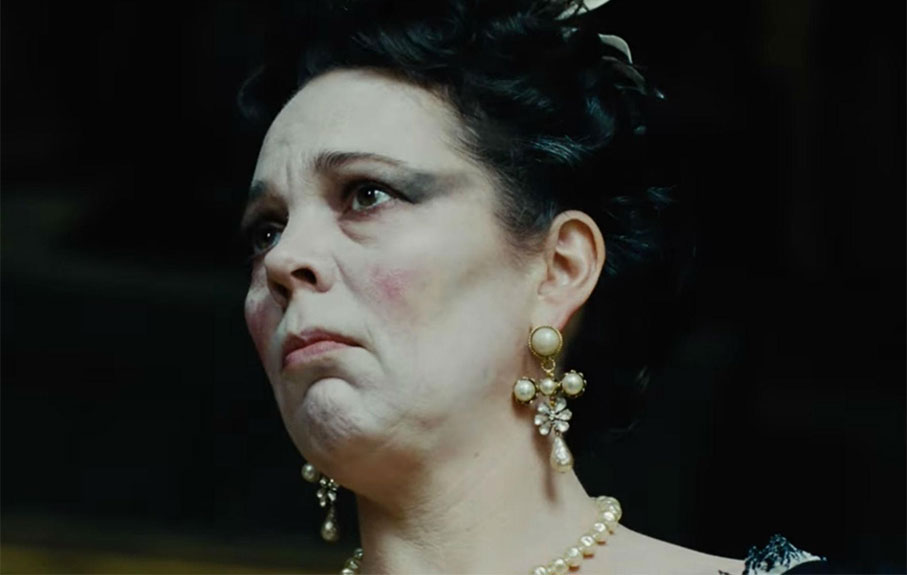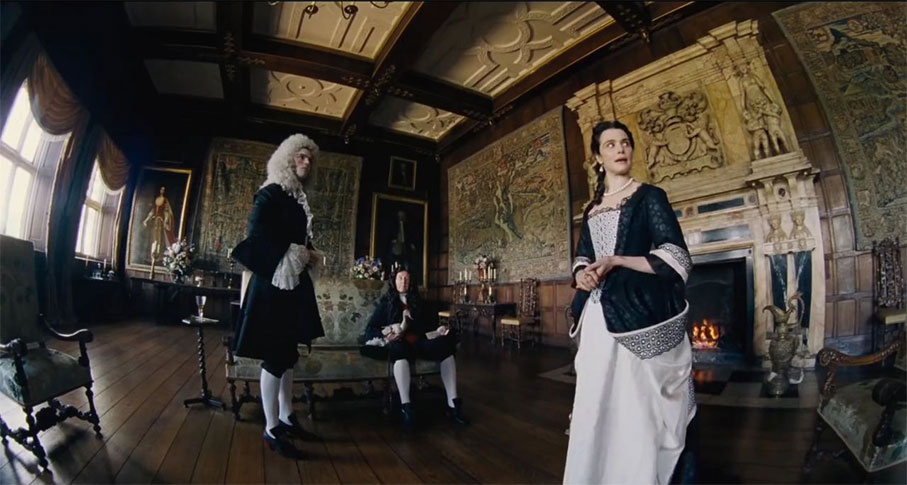|
As sub-genres go, few feel more set in their stylistic ways than period dramas based around stories of royalty or the aristocracy. Shots tend to be formally composed and lit to showcase the costumes and architectural grandeur of the palaces and country houses in which they are set, camera moves tend to be restricted to smoothly executed crane and tracking shots, and dialogue is usually delivered in Oxbridge English and underscored by a Handel-esque orchestral or harpsicord score. For whole swathes of their running times, such films can play like promotional videos for the historic buildings managed by the likes of English Heritage. If you approach The Favourite with such expectations – and given its subject matter and the nature of the publicity material, it's rather hard not to – then you're likely to experience a bit of a jolt. Yes, the story revolves around Queen Anne and is set primarily in her palace of residence, but the film was directed by Yorgos Lanthimos, and if you've seen any of his previous work (and you really should have), then you'll know that he's not all that interested in convention.
Although there is no introductory text to confirm this, history suggests that the story takes place in the early years of the 18th Century when the British Empire was ruled by Queen Anne (Olivia Colman), who by this point in her life is widowed and in faltering health and who trusts her childhood friend, close confident and secret lover Lady Sarah Churchill (Rachel Weisz) to deal with parliament and make political decisions on her behalf. One day, Sarah's distant cousin Abigail (Emma Stone), a former aristocrat who has fallen on difficult times, rolls up at the palace door in search of employment, and is given a position as a servant and assigned to the kitchens. When she witnesses the pain that an attack of gout causes the Queen, she makes a poultice for her from herbs that proves effective, prompting Sarah, who is initially angry that she bypassed official protocol, to promote her to a position as her personal handmaiden. Soon, however, Abigail also finds favour with the Queen, and a bond develops between them that begins to threaten Sarah's position as her majesty's favourite.

From the opening scenes, Lanthimos makes it clear that this is not going to play by the period drama rulebook by abandoning the formalist cinematic approach for which the subgenre is known in favour of disorientating angles, speedy follow shots and an eye-popping use of fish-eye lenses and rapid pans. This playful approach is matched by early dialogue exchanges, which are snappily written and are delivered with a skill for comic intonation and timing that is doubly remarkable when you consider that English is the director's second language. These exchanges also economically establish some key character details. An early conversation between Anne and Sarah, for example, paints the former as an insecure child and the latter as her irritable mother, as Sarah testily dismisses Anne's attempt at eye makeup ("It makes you look like a badger") and sends her to her rooms, which prompts a humbled response from Anne that is shortly followed by a pride-damaged verbal assault on a nearby page boy. It's a delightful, funny and revealing sequence that delivers more character information and entertainment value in one briskly handled minute of screen time than some films I saw last year did in their entirety. This break with tradition is matched by a music score that blends traditionalist fare from the likes of Vivaldi, Bach, Beethoven and – yes – Handel with the more experimental and sometimes disconcerting sounds of Luc Ferrari's Discadelies, Ólafur Arnalds' unfold and the Love Themefrom last year's trippy horror Mandy by Jóhann Jóhannsson.
The script, which was written by Deborah Davis and refined over the course of several years by Tony McNamara in collaboration with the director, really crackles, delivering some priceless exchanges in the film's first half and often so laced with intrigue and subtext that I just know I'll need a second and third viewing to unpack all of the secondary meaning. That it works as well as it does, however, is down to a trio of utterly superb performances from its female leads, about whom I feel I could write a small book. Let's start with Olivia Colman, who for me is in danger of toppling Tilda Swinton's long-held position as my favourite British actor. Colman is always a delight to watch and her range is extraordinary – just compare her heart-rending role as abused charity shop worker Hannah in Paddy Considine's Tyrannosaurwith her hilarious turn as the giggly, double entendre-loving PC Doris Thatcher in Edgar Wright's Hot Fuzz, and that's just a sampling. Here she captures both sides of Anne's troubled personality, and is able to switch from spoilt child (her almost tearful admission that her makeup does indeed make her look like a badger is the response of an infant that's been forced by an angry parent to admit its wrongdoing) to furious monarch with a full understanding of the power she wields at the drop of a wig. The sequence in which she reveals to Abigail the tragic reason why she keeps 17 pet rabbits is so perfectly and delicately pitched that prompted me to let out an audible whimper. As Sarah, Rachel Weisz is so commanding in her delivery and body language that I believed from her first, supremely self-confident conversation with opposition leader Harley (an impressively pompous Nicholas Hoult) that an all-male parliament would unquestionably defer to her authority. Emma Stone, meanwhile, has one of current cinema's most expressive faces (her wonderful performance as the drug-addicted Annie Landsberg in the Netflix series Maniac was for me one of the best of 2018) and she's just terrific here, from her disgusted awkwardness at the realisation that the man sitting opposite her in the carriage in which she is travelling is tossing himself off, to the impeccable timing of her delivery of the line "I'm sorry, I don't know what to do" when caught in the middle of an argument about hot chocolate between Sarah and Anne. She also provides the film with one of its biggest laugh-out-loud moments when Sarah suggests that she might be employed as a monster for children to play with. I'll say no more.

Despite the sprightly comedy of the early scenes, it seems inevitable that things will eventually take a darker turn, as the power struggle between Sarah and Abigail poisons both against each other and the destructive nature of their rivalry impacts on all three women. Increasingly, the tragedy of Anne's mental and physical weakness is brought painfully home, as she becomes a pawn in an increasingly ruthless game that under different circumstances she could have more easily seen through and even resisted. The later scenes in particular are as sobering as they are revealing, and it's here the strongest hints are provided of Sarah and Abigail's differing motivations, while a particularly debilitating turn in Anne's steadily diminishing health (one that is a matter of historical record) is never discussed nor shown but communicated solely though Colman's extraordinary performance.
The sheer breadth of cited influences on Lanthimos's approach is fascinating, ranging as it does from Peter Greenaway's The Draughtsman's Contract and Milos Foreman's Amadeus to Andrzej Zulawski's Possession and Juraj Herz's The Cremator. But there's never a sense of borrowed technique here, and Lanthimos puts his own stamp on every scene and every eye-catching camera angle, a task aided immeasurably by ace cinematographer Robbie Ryan's willingness to experiment with techniques that on paper shouldn't work for this material but somehow do. It goes without saying that a film this unconventional in approach is likely to present some problems for those who like their period dramas formal, polite and historically accurate (it has its share of playfully anachronistic elements, is not shy about its sexual content and some of the dialogue is – shall we say – on the strong side). For me, however, it proved to be the very nicest of surprises, and it seems only appropriate that the first new film that I saw in 2019 may well end up justifying its title in my end-of-year round-up.
|